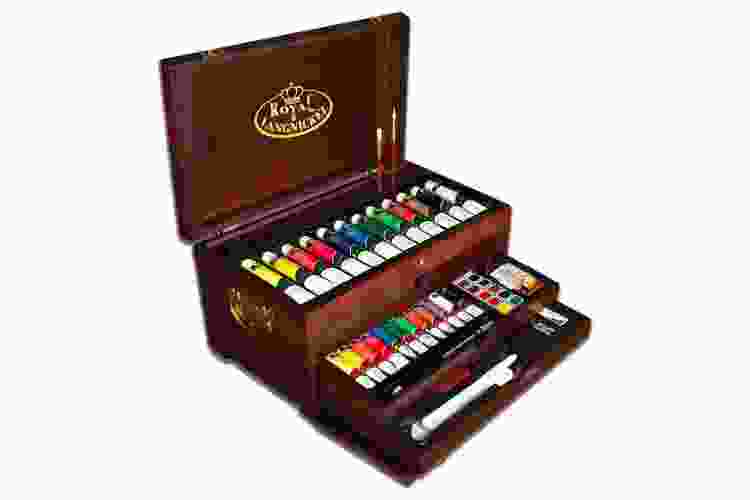The Best Acrylic vs. Oil Painting Guide for 2025

Are you searching for advice on acrylic vs. oil paint? Maybe you’re interested in creating wall art for your home, upcycling a cabinet or painting a vase to hold a colorful bouquet. If it’s paint tips and ideas for portraits, ceramics, wood and other projects you’re looking for, you’ve come to the right place.
Painting is one of the oldest forms of art and makes a fun and unique way to explore creative expression. According to Art and Healing, “creative expression has the power to improve wellbeing by helping us understand ourselves and shifting perspectives that reinforce positive behaviors.”
Making art can reduce blood pressure, improve brain cognition, fight inflammation and strengthen the immune system. It’s a win/win all around. We’ve compiled our guide to help budding artists with questions like “Is acrylic or oil paint better?” or “Is oil painting easier than acrylic?” Check out our article on how to get acrylic paint out of clothes if you've made a little mess with one of these mediums.
Jump to Section
- Learning Acrylic vs. Oil Painting for Beginners
- Main Differences Between Acrylic vs. Oil Paint
- Acrylic vs. Oil Paint on Canvas
- Acrylic vs. Oil Paint Price
- Acrylic vs. Oil Paint Sets
Learning Acrylic vs. Oil Painting for Beginners
If you’re wondering how to start oil painting or how to learn to paint with acrylics, art classes are the best way to get started with a new hobby like painting. Classes make it easy to learn acrylic vs. oil paint for beginners.
From art classes in Atlanta to art classes in Chicago and art classes in Los Angeles, you’ll find a wide variety of ways to hone your skills and learn about acrylic vs. oil paint techniques.

Discover skills such as how to clean paint brushes, how to make brown paint and how to make red paint as well as all about paint mediums and how to gather acrylic painting ideas for beginners.
There are plenty of art classes near you to gather tips and techniques. Check out online painting classes for even more convenience and to learn about acrylic vs. oil painting for beginners as well as some of the differences between acrylic and oil paints to get started with painting.
Main Differences Between Acrylic vs. Oil Paint
How They're Made
Oil paints are made with binding agents, color pigments and an oil base (usually linseed or safflower), making them thick and oily. They also have a smooth and creamy consistency.
Acrylic paints are manufactured like oils but without oil. They’re water-based, which makes them safer to use. They’re a great option for beginners. You can gain practice and work on techniques before moving on to oil paints.
How They're Used
Acrylic is a terrific choice for beginners as it can be used on any type of surface from paper, plastic and canvas to fabric, wood, metal, and glass. It does dry quickly.
So, why use oil over acrylic? Oil paints are thinner and take a longer time to dry. This gives you more time to work with them. You can start a painting, take a break and come back later to finish. Since they have oil in the mix, oil paint needs to be used on a prepared canvas or board.

Pros and Cons of Each
Acrylic paints deliver a crisp edge. You can mask areas to create graphic lines. They are harder to blend than oil paints, but acrylic paint stays bright and fresh over time.
The downside with acrylic paint is that it can change color after drying. It may seem lighter when the paint is first applied but then dry to a darker shade.
For smooth blending, oil paint is an excellent choice. Because they dry slowly, you can easily blend colors and achieve smooth lines. Oil paints stay predominately the same color; however, they can take on a yellow hue over time.
Acrylic vs. Oil Paint on Canvas
When it comes to the question of “Is acrylic or oil paint better for canvas?” it depends on what type of painting you’re doing and the type of canvas. A traditional art canvas is the perfect surface for acrylic paint.
When painting on canvas and thick boards, most artists use oil paints. Since oil paints have an oily base, they require a primer as a base coat to help the paint adhere to the surface.

Why do artists use oil over acrylic paint? Oil paints are excellent for portraits, as you can create layers and shadows. Acrylics dry too quickly for this technique.
However, when considering acrylic vs. oil paint for cabinets or other surfaces besides canvas, acrylic is the best type of paint to use for adhesion and color vibrancy. It’s not as likely to flake or peel from the wood over time. Apply a thin layer of wood primer before painting for the best results.
Acrylic vs. Oil Paint Price
Oil paint vs. acrylic price points vary. With oil paint, you’ll need to use more specialized items, such as a solvent and special paint brushes, which can be more expensive. Oil paints require a primed canvas.
You can also prime the canvas yourself. When painting with oil paints, you need to be in a well-ventilated room as some oil paints contain additives such as turpentine, varnish or mineral spirits.
Acrylic paint is a simpler and less time-consuming paint type. You can use water as an additive if needed, which puts acrylic paint at the lower end of the price spectrum.

Acrylic vs. Oil Paint Sets
If you're just getting into a new painting hobby, a paint set makes a world of sense. There are a wide variety of acrylic and oil paint sets available to get started on your artistic journey.
-
The Winsor & Newton Galeria acrylic paint set holds 10 2 oz. tubes of basic colors, making it the perfect set for beginners. They feature high pigment levels and specially formulated colors for superb coverage and smooth texture that can be used on many different surfaces. The paint has a satin finish for depth.
-
An acrylic paint set such as the Mont Marte Acrylic Paint Set comes with 24 tubes of 36 ml. paint. It’s terrific for paper, wood, metal, canvas and leather.
-
If you're looking for a set that includes acrylic paint, oil paint and even watercolor paint and more, go all out with the beautiful Royal & Langnickel Artist Premier Painting Chest. The set includes 80 different pieces, which consist not only of paint but also brushes, pencils, a paint palette and so much more.

Whether you’re just getting started or want to bring new skills to the palette, this guide for acrylic vs. oil paint is designed to help you get started. You’ll soon be able to create colorful and vibrant works of art with professional-level layers, texture and shadows.
For even more fun art ideas, check out other experiences happening on Classpop!

